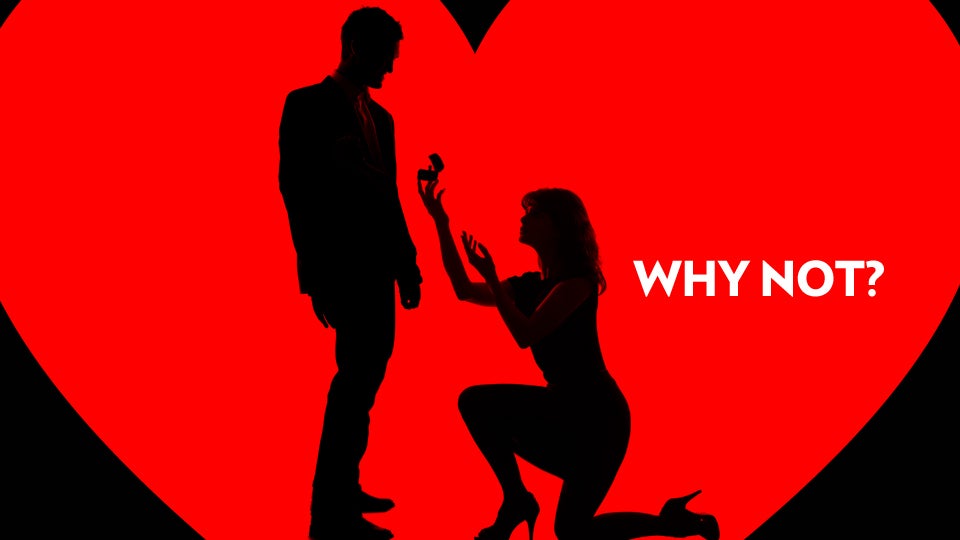Why is it not socially acceptable for women to propose to men?
What are the reasons behind the social norm of men proposing to women?
Why do women change their names when they got married? Why not men?
What is the history of marriage and the history of the name changing?
Women can't propose because they would seem too forward - What does that even mean? Why are we (as a society) still concerned about women being too forward? What about men?
As much as we talk about equality and as much as we have advanced as a society, there is still a major gap between women and men when it comes to gender roles in the family. The proof is in the fact that it's still a big deal for the man to propose to the woman and not the other way around. If there was more equality, then either sex could do the proposing.
I read an article at livescience.com that discusses whether it's ok for women to propose to men. It was a very interesting piece that explored various angles. This article was a good start to my research and has opened up many more questions and directions to explore.
"... the study of college students at a liberal-leaning university found that not a single man or woman wanted a proposal in which the woman asked the man to marry her."
Why not? What's so wrong with the woman proposing? Why are men (and women) so against it?
"... while 60 percent of women said they were "very willing" or "somewhat willing" to change their surname to their husband's upon marriage, 64 percent of men said they were "very unwilling" or "somewhat unwilling" to do the same for their wives."
I have some issues with this statistic. I actually think 64 percent is low for the amount of men unwilling to change their last name. That is pretty unheard of. Women almost always change their last name when they get married. It would be interesting to see married couples create their own last names in order to create their own identity as a couple. Instead of Mary Patton marrying John Smith and then becoming Mary Smith, it would be neat if both John Smith and Mary Patton became John and Mary Smitton, or John and Mary Pattith, or whatever name they came up with together. Of course, there's a lot that goes into names - family, traditions, legacies, identities, etc. But why do women have to change their names and men don't?
"... the strongest believers in traditional marriage roles tend to be people high in benevolent sexism, or attitudes that women should be cherished, protected and given special treatment."
Benevolent Sexism - what is this? (explore a bit more) basically, the idea that women are the weaker sex and should be taken care of or protected... or put on a pedestal.
feminist activist Gloria Steinem: "A pedestal is as much a prison as any small, confined space."
"One man, for example, said that if he did not propose, he would "feel emasculated." A woman responded that female proposals would just be "very awkward.""
Why would a man feel emasculated? That would mean that the marriage proposal is somehow tied to his male identity. How does proposing make him a man? How does not proposing make him not a man? Is this because of social norms or is there something else here?
Reasons why men "should" propose
- traditional gender roles
- romance
- women fearing rejection
- women seeming too forward

I can relate to this because my mom didn't change her last name. Both my parents are feminists and they both agreed that as an equal couple, my mom shouldn't have to take my dad's last name. Instead they Hyphenated it, with my mom's last name first, I might add. Before reading your blog, I'll admit that I'd never really put that much thought into this topic. But after reading this, I'm starting to wonder too. I don't see what's so bad with the woman purposing. Guys have to deal with fearing rejection too. And wouldn't a guy seem too forward as well? I think with that it all depends on how long the relationship is, rather than the gender of the person purposing. We read "The Trophy Wife." This relates to your topic because according to "The Trophy Wife," guys are becoming attracted to stronger/intelligent women. So benevolent sexism should be becoming less of an issue, I would think. I'm thinking that it's probably mostly traditional gender roles that prevent a woman from proposing. I look forward to reading more of your blog!
ReplyDeleteIn my personal opinion, traditional proposes and traditional marriages have direct relationship with the culture of each country. Partners have individual believes and also, religions play a big role in this decision. Additionally, families with traditions and commitments with society and politics need to follow some rules to be presented well and correctly to the societally and class that they belong to. Some formal situations create benefits to couples who follow the rules of culture, so couples received more social acceptation, and even job or recognitions. In the other side, informal situations, have less limitations in the moment to evaluate differences between man and woman rights.
ReplyDelete